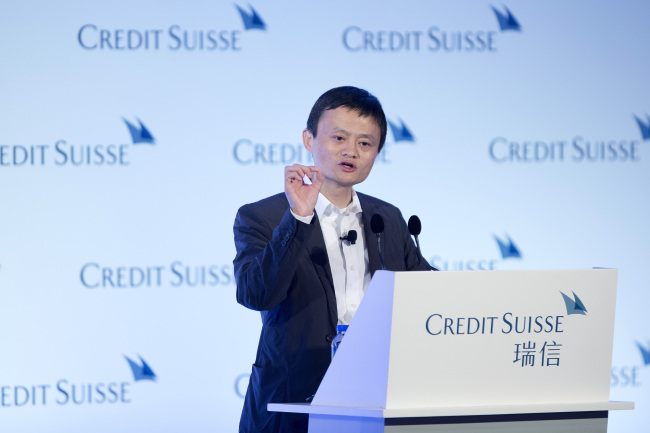 |
Jack Ma, chairman of Alibaba Group Holding Ltd. (Bloomberg) |
Alibaba Group Holding Ltd. is preparing to file for an initial public offering in the next few days that reflects an evolution of China’s economy: The high-tech vision of executives like Alibaba’s Jack Ma is edging out Mao Zedong’s dream of a nation covered in smokestacks.
The world’s second-largest economy has reached a tipping point in its drive to become a global technology giant to rival the U.S. or South Korea. Last year, for the first time, electronics surpassed steel as the largest industry by revenue, with the rise of companies like Huawei Technologies Co. and Xiaomi Corp. Alibaba is the latest sign of change, building an e-commerce business that connects buyers and sellers of everything from fruit to forklifts.
A blend of government policy and consumer demand is nudging China away from state-led heavy industries such as steel and cement toward a demand-led, market-driven model of electronics and services. Technology’s advance may help deliver the higher wages, jobs and productivity gains the nation needs to maintain economic growth and raise living standards.
“This is significant because it shows they are adjusting industrial structure,” said Karlis Smits, senior economist at the World Bank in Beijing.
Sales from electronics totaled 7.7 trillion yuan ($1.2 trillion) in 2013, compared with 7.6 trillion yuan from steel smelting, according to China’s National Bureau of Statistics. In 2012, sales of electronics totaled 6.9 trillion yuan, trailing the 7 trillion yuan for steel.
South Korea’s economy reached a comparable tipping point between 2001 and 2003 when manufacturing of electrical and electronic equipment surpassed petrochemicals and metals. Last year, electronics alone was 16 percent greater than metals, textiles and petrochemicals combined, led by Samsung Electronics Co., the world’s largest mobile-phone maker.
China has its own technology powerhouses. Lenovo Group Ltd. surpassed Hewlett-Packard Co. to become the world’s top personal-computer maker in 2012, while Huawei has climbed to No. 2 in the telecom-equipment industry. China Mobile Ltd. has become the top wireless operator, with 781 million subscribers. Smartphone maker Xiaomi is challenging Apple Inc. and Samsung.
Almost two decades after Ma started Alibaba, it has become the nexus for online commerce in the world’s second-largest economy, connecting 7 million retailers to customers across China. Analysts estimate the IPO will value Alibaba at $136 billion to $245 billion. At the top of the range, the company would rank behind only Google Inc. among the most valuable Internet companies, eclipsing Amazon.com Inc. and Facebook Inc.
The rise of electronics is occurring in tandem with the expansion of a consumer class that works in services, owns the best digital devices China can make, and enjoys life more than their parents.
Two recent stock offerings illustrate the changes under way. The largest domestic initial public offering so far this year has been for Shaanxi Coal Industry Co., a classic old-China company. The second-biggest was for soy-sauce maker Foshan Haitian Flavouring & Food Co., a beneficiary of the new consumerism.
Foshan heralds the fading of “extreme dependence on investment and debt to drive growth,” according to Gavekal Dragonomics, a Hong Kong-based consulting firm.
Foshan boosted revenue last year 19 percent to 8.3 billion yuan, while Shaanxi Coal’s sales declined 2.3 percent to 42.4 billion yuan. (Bloomberg)








